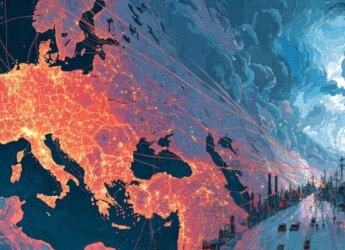Editor’s Note: ComplexDiscovery OÜ continues its ongoing coverage of the Russia-Ukraine conflict, with our staff reporting today from Warsaw, Poland. As the war enters its third year, the situation on the ground remains tense, with recent escalations in Russian attacks on Ukrainian energy infrastructure and civilian areas. Our team is dedicated to providing timely, accurate, and in-depth analysis of the latest developments in this protracted conflict. Today’s update, as are all regular conflict updates, is based on in-depth analysis from the Institute for the Study of War (ISW); the update also includes some elements of interpretation and analysis to provide additional context to the situation.
Source Note: One of the most accurate and detailed sources for ongoing updates on the Ukraine crisis is the Russian Offensive Campaign Assessment from the Institute for the Study of War. The Institute for the Study of War (ISW) is a 501(c)(3) organization and produces strictly non-partisan, non-ideological, fact-based research. ISW seeks to promote an informed understanding of war and military affairs through comprehensive, independent, and accessible open-source research and analysis. ISW’s research is made available to the general public, military practitioners, policymakers, and media members. Providing a daily synthesis of key events related to the Russian aggression against Ukraine, ISW updates may benefit investigators and litigators as they follow the business, information technology, and legal trends and trajectories impacted by and stemming from the current Russo-Ukrainian conflict.
For those seeking to grasp the full scope of this evolving landscape, the complete updates from the Institute for the Study of War serve as an invaluable resource.
Content Assessment: Reporting from Warsaw: Russia Escalates Attacks on Ukraine's Infrastructure as Conflict Intensifies
Information - 92%
Insight - 90%
Relevance - 90%
Objectivity - 94%
Authority - 95%
92%
Excellent
A short percentage-based assessment of the qualitative benefit expressed as a percentage of positive reception of the recent article from ComplexDiscovery OÜ titled "Reporting from Warsaw: Russia Escalates Attacks on Ukraine's Infrastructure as Conflict Intensifies."
Background Note: ComplexDiscovery’s staff offers distinctive perspectives on the Russo-Ukrainian war and Iran-Israel conflict, informed by military experience on the West German, East German, and Czechoslovakian border during the Cold War and in Sinai as part of Camp David Accord compliance activities. This firsthand regional knowledge, combined with proficiency in cybersecurity, information governance, and eDiscovery, enables multifaceted analysis of these conflicts, including the critical impact of cyber warfare, disinformation, and digital forensics on modern military engagements. This unique background positions ComplexDiscovery to provide valuable insights for conflict-related investigations and litigation, where understanding the interplay of technology, data, and geopolitical factors is crucial.
Russo-Ukrainian Conflict Update*
Reporting from Warsaw: Russia Escalates Attacks on Ukraine’s Infrastructure as Conflict Intensifies
ComplexDiscovery Staff in Warsaw, Poland
In the ongoing conflict between Russia and Ukraine, Russian forces launched a large-scale drone and missile attack on Ukrainian energy infrastructure and civilian areas late on May 31st and into the early hours of June 1st. According to Lieutenant General Mykola Oleshchuk, the Ukrainian Air Force Commander, the assault involved 47 Shahed-136/131 drones and 53 missiles, including 35 Kh-101/555 cruise missiles launched from aircraft over the Caspian Sea, four Iskander-M ballistic missiles and an Iskander-K cruise missile fired from occupied Crimea, 10 Kalibr cruise missiles launched from the northeastern Black Sea, and three Kh-59/69 cruise missiles deployed by aircraft over Russian-controlled parts of Zaporizhia Oblast.
Ukrainian air defenses managed to intercept and destroy a substantial number of the incoming weapons, including 46 Shahed drones, 30 Kh-101/555 cruise missiles, the Iskander-K cruise missile, and four Kalibr cruise missiles. However, several critical energy facilities and civilian areas still suffered significant damage. The Ukrainian Energy Minister, Herman Halushchenko, reported that Russian missiles struck energy infrastructure in Zaporizhia, Dnipropetrovsk, Donetsk, Kirovohrad, and Ivano-Frankivsk oblasts.
According to Ukrhydroenergo, Ukraine’s state-owned hydroelectric power plant (HPP) regulator, two unspecified HPPs sustained critical equipment damage. DTEK, Ukraine’s largest private energy operator, also reported serious damage to two thermal power plants (TPP). Russian military bloggers claimed that the targeted facilities included the Kremenchuk HPP in Kirovohrad Oblast, the Dnipro HPP in Zaporizhia Oblast, the Burshtyn TPP in Ivano-Frankivsk Oblast, and the Ladyzhyn TPP in Vinnytsia Oblast. Additionally, Ukrainian officials reported damage to civilian areas, critical infrastructure, and energy facilities in Kharkiv, Lviv, Vinnytsia, Odesa, Kherson oblasts, and Zaporizhzhia City.
The escalating Russian attacks on Ukraine’s energy grid and populated areas are part of an ongoing campaign to weaken Ukraine’s military and economic capacity. Despite the success of Ukrainian air defenses in intercepting many of the incoming weapons, Russia appears determined to continue these bombardments. Military analysts suggest that the Kremlin is also seeking to overextend Ukrainian forces by threatening new potential fronts in the north, near the borders of Bryansk and Kursk oblasts inside Russia, which could force Ukraine to reallocate troops from active combat zones in the east.
Ambiguity surrounding US authorizations for Ukraine to strike targets on Russian soil using American-provided weapons is further complicating the situation. The lack of clear guidance from Washington has left Ukrainian leaders frustrated about the limits of their forces’ “counter-fire” capabilities. Experts argue that the US is failing to seize an opportunity to more effectively deter Russian aggression and preparations for offensive action along the border.
Meanwhile, Ukraine’s Western allies are sending conflicting signals regarding the future use of advanced weapons systems, such as F-16 fighter jets, once Ukrainian pilots complete their training later this year. Belgium has stipulated that their planes must only be used over Ukrainian territory, while the Netherlands maintains that they are not imposing such restrictions, provided that Ukraine adheres to international law and the UN charter’s inherent right to self-defense against armed attack.
Ukrainian President Volodymyr Zelensky has acknowledged that some Ukrainian reserve brigades remain understrength, citing delays and shortfalls in arms deliveries from the US as a major factor hindering efforts to properly equip, expand, and rotate frontline units to maintain an effective defense. Kyiv asserts that Russian forces are attempting to exploit these weaknesses by applying pressure on Ukrainian lines in multiple directions, forcing them to spread their resources thin.
The timely arrival of the latest shipments of heavy weaponry and ammunition from the US and NATO, expected within the next one to two months, could be crucial to Ukraine’s ability to withstand the Russian onslaught. These reinforcements are needed to strengthen reserve formations and create new units capable of countering Russia’s current advantages in artillery, armor, and manpower.
As a frontline NATO member state and strong supporter of Ukraine, Poland continues to support military and humanitarian efforts for the protracted and increasingly intense conflict. The Polish government has called for strengthening the alliance’s eastern defenses while serving as a critical conduit for supplies and equipment flowing into Ukraine. Simultaneously, Polish citizens and aid organizations are working to accommodate the millions of refugees who have crossed the border since the beginning of Russia’s invasion.
With no clear end to the war in sight, Ukrainians remain resolute in the face of Russia’s ongoing assault. However, as the conflict becomes increasingly brutal and the path to victory remains uncertain for either side, it is difficult to predict how long this bloody stalemate may persist. ComplexDiscovery OÜ staff will continue to closely monitor developments on the battlefield and in the diplomatic arena, providing timely updates on this still-unfolding crisis at the heart of Europe.
News Sources
- Institute for the Study of War (understandingwar.org)
- Ukraine Pushes Back: Tactical Battles in Northern Kharkiv and the Geopolitical Chessboard (complexdiscovery.com)
- Current Events Archives – ComplexDiscovery
As a leading source for cybersecurity, information governance, and legal discovery insights, including international investigations and litigation, ComplexDiscovery OÜ recognizes the importance of awareness regarding alleged and documented criminal acts, particularly in the context of the Russia-Ukraine conflict. While we, following the lead of the Institute for the Study of War (ISW), do not provide detailed coverage of war crimes in our primary reports, we encourage professionals within the eDiscovery ecosystem to stay informed about these activities. This awareness is crucial for understanding potential future legal actions and responsibilities.
Detailed Reporting with Maps for June 1, 2024, from the ISW – Mouseover to Scroll
Ukraine Control of Territory - June 01 2024Review the Detailed Reporting and Maps PDF
About the Institute for the Study of War Research Methodology
ISW’s research methodology relies on both primary and secondary sources, enabling researchers to develop a comprehensive understanding of the situation on the ground. In order to analyze military and political developments in any given area, ISW’s research analysts must wholly understand the systems of enemy and friendly forces. They must also understand the population demographics, physical terrain, politics, and history of that area. This lays the analytical foundation for understanding the reasons for particular developments and fulfilling their assigned research objectives. ISW analysts also spend time in places like Iraq, Afghanistan, and elsewhere in order to gain a better understanding of the security and political situation and to evaluate the implementation of current strategies and policies. Our researchers compile data and analyze trends, producing a granular analysis of developments in areas of research, producing an accurate, high-resolution, timely, and thorough picture of the situation. ISW’s research methodology guarantees its success and commitment to improving the nation’s ability to execute military operations, achieve strategic objectives, and respond to emerging problems that may require the use of American military power.
About the Institute for the Study of War
The Institute for the Study of War advances an informed understanding of military affairs through reliable research, trusted analysis, and innovative education. We are committed to improving the nation’s ability to execute military operations and respond to emerging threats in order to achieve U.S. strategic objectives. ISW is a non-partisan, non-profit, public policy research organization.
Learn more, get involved, and contribute today.
Additional Reading
- From Dissent to OSINT? Understanding, Influencing, and Protecting Roles, Reputation, and Revenue
- [Annual Update] International Cyber Law in Practice: Interactive Toolkit
- Data Embassies: Sovereignty, Security, and Continuity for Nation-States
Assisted by GAI and LLM Technologies
* Sourced and shared with direct express permission from the Institute for the Study of War (ISW).
Source: ComplexDiscovery OÜ

























